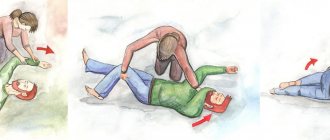Clouding of consciousness is a consequence of serious changes in a person’s mental state and is characterized by a loss of the ability to think clearly and logically at the level that is familiar to him. Often the patient completely or partially loses the ability to make independent decisions, ceases to orient himself in time, and does not recognize people and familiar places. Signs of clouding may appear unexpectedly or develop gradually over a long period of time.
The following symptoms may indicate that a person is experiencing clouding of consciousness:
- confusion, unclear and slow thinking;
- confusion, embarrassment;
- disorientation;
- memory loss or impairment;
- confusion
- mental personality change.
Causes of blurred vision
There are the following reasons for the appearance of this symptom:
Refractive errors
- Myopia. Blurry vision in one eye or both eyes may be a sign of nearsightedness. A person tries to squint his eyes and experiences eye strain and a headache.
- Astigmatism. Blurred vision at all distances is a symptom of astigmatism. The appearance of astigmatism is caused by the irregular shape of the cornea. Astigmatism can occur only in one eye or in both eyes.
- Farsightedness. Blurred vision from farsightedness causes objects at close range to become blurry. In cases of high farsightedness, even distant objects may be blurry.
- Presbyopia. If you are over 40 years old and have begun to experience blurred vision when looking at small print and objects at close range, then this is presbyopia. The condition is associated with loss of elasticity of the lens.
Cataract
The appearance of blurred vision, as well as glare and “halos” around light sources, can be signs of cataracts.
Glaucoma
Foggy vision or “tunnel vision” may indicate glaucoma. Symptoms may include a gradual or sudden narrowing of your visual fields, accompanied by the development of severe blurred vision.
Age-related macular degeneration
Gradual loss and blurring of vision combined with distortion of straight lines are signs of macular degeneration. Leading cause of vision loss in old age
Vitreous opacities
The appearance of destruction of the vitreous body is also accompanied by this symptom.
Chronic dry eye syndrome
Dry eye syndrome can affect your vision, causing occasional blurred vision.
Migraine
Often, with a migraine, flashes of light, flickering and blurred vision appear before an attack.
Pregnancy
Deterioration of vision and blurred vision during pregnancy is associated with changes in hormonal levels. Hormones during pregnancy can change the shape and thickness of the cornea, causing this symptom.
Wearing contact lenses
Violation of the terms of wearing lenses causes the appearance of protein deposits in them. which can cause blurred vision.
Urgent Care
The danger of twilight disorder of consciousness is that the patient, under the influence of hallucinations, anxiety, and anger, can cause quite serious harm to himself and others, since extreme strength and aggression awakens in him. He can attack anyone nearby, destroy furniture, etc.
To avoid accidents and other negative consequences, you need to react to this condition very quickly. Of course, it is necessary to call an ambulance, but before the arrival of a specialized team, to ensure the safety of the patient, the patient should be persuaded to sit or lie down on the bed and not be left alone for a minute. It is necessary to ensure that there are no breakable or piercing objects, flammable or other dangerous substances nearby. You should not let him near windows, balconies, or doors.
For safe transportation of the patient, he is fixed and 2-4 ml of sibazon solution (0.5%) or Relanium, Seduxen, diazipam is administered intravenously. This is usually enough to calm him down. If the drug does not work, after 10 minutes you will have to administer half the dose of the same medicine. Neuroleptics with suprastin or diphenhydramine, as well as chlorpromazine, have a similar effect, but it lowers blood pressure, so it is not suitable for everyone.
A gloomy state can be a manifestation of epileptic seizures, then the gloom can be one-time or repeated. If a diagnosis of epilepsy is made and medications are prescribed, then the attack can be stopped with the prescribed medications. If psychomotor agitation does not go away, but increases, then mandatory hospitalization is required.
How to treat cloudy eyes
Glasses, contact lenses, or refractive surgery (LASIK) are the most common ways to correct refractive errors.
Age-related presbyopia affects almost everyone over the age of 45. Most people use reading glasses or special lenses (multifocal, bifocal or progressive lenses for presbyopia).
For chronic dry eye syndrome, artificial tears or moisturizing gels will help.
Cloudy eyes due to cataracts can be treated with surgery. For glaucoma, it is necessary to prescribe eye drops that reduce eye pressure. In some cases, surgical treatment is necessary.
Causes of clouding of consciousness
Clouding of consciousness can be caused by various reasons:
- intoxication (including alcohol and drugs);
- overwork;
- head injuries and concussions;
- amnesia;
- hypoxia;
- insomnia;
- dissociative and various mental disorders;
- hypothermia;
- infectious diseases;
- malnutrition and critical dehydration;
- diabetes;
- heatstroke;
- heart attack and heart rhythm disturbances;
- use of certain medications;
- unfavorable environmental factors.
Clouding of consciousness is often a consequence of various diseases, such as mass formations in the brain, hypothyroidism, sepsis, renal failure, fever, epilepsy, depression, Alzheimer's disease, schizophrenia, etc.
Preventing blurred vision
Here are some tips to help you avoid cloudy eyes:
- Visit your eye doctor regularly to ensure early diagnosis of conditions that may be causing cloudy vision.
- If you wear contact lenses, strictly observe wearing times and personal hygiene
- If you have a history of hypertension and diabetes, be sure to visit an eye doctor once every 6 months
- If you have chronic dry eye syndrome, use moisturizing drops to reduce symptoms.
Clouded consciousness and increased anxiety
The following condition occurs at intervals of once a week: the head becomes cloudy (cloudier than consciousness, fog, a veil in the head), this is accompanied by a significant increase in anxiety, things that normally do not bother begin to worry, i.e. stable anxiety without significant reasons, at a fairly significant level (but not the level of panic attacks). This condition does not go away on its own. If it starts, then the next day it will happen the same way in a week. Phenazepam helps, 0.5-1 mg and after 1-2 hours it’s as if nothing happened. But about a week later the same thing happened again. Regardless of the weather, time of year, mood in the previous period, whether you were resting or working before. I cannot understand the trigger, i.e. in reality, some negative event can happen and such a state does not occur, it occurs out of the blue, even if you have been in an excellent, cheerful mood all week and then this state may turn on. Judging by the fact that this state turns on at approximately equal intervals of time, there appears to be no external trigger. Alcohol, graduxin, afobazole - zero effect. Phenazepam always gives 100% results. I have been remembering such conditions for about 3 years, but previously it was not so often “mixed” with other psychological problems. Now only this problem remains. I have been experiencing depressive-anxious-apathetic states for a long time: at first I was not aware of them, when over the course of several years these states intensified, I went to the doctors, and I myself began to study a lot of things from psychology to Ayurveda. In general, this issue has been resolved.
When I took Paxil, it helped me a lot with depression, but it didn’t have any effect on what I described above. I did an MRI of the brain, an ultrasound of the thyroid gland, and in addition to a psychotherapist/neurologist, I was examined by an endocrinologist, an ophthalmologist, and general analysis/biochemistry. We didn't see anything. Recently I visited a good therapist, he said that he could guess what the reason might be, he prescribed 7 droppers of Mexidol and another drug I forgot the name of “qi”, they also had no effect.
Who has what versions, what is it and what to do with it?
Author's addition from 08/27/18 17:44:34 >Have you consulted a psychiatrist? I consulted a psychotherapist, psychologist, and neurologist both in person and in absentia. With this particular problem, nothing has moved forward.
Author's addition from 08/27/18 17:51:41 >It is similar to a number of diseases. I would be grateful if you listed them. This is actually why I asked the question. I don’t need a diagnosis in absentia; they haven’t been able to give me one in person until now. But I’ll at least read the descriptions of the diseases, maybe I’ll find additional similarities with my problem in some way, and after that I’ll be able to turn to a specialist for help with a broader picture. So far, with such a picture, as I already said, for 3 years, neither the diagnosis, nor the sources, nor the removal of symptoms, nothing has budged, I came to phenozepam, which helps, I myself, the specialists prescribed other drugs that did not have any effect.
Author's addition from 08/29/18 10:47:36 >Are there problems with maintaining attention and memory? Yes, significant. It’s very difficult to read, you read the page and realize that your thoughts were all in another place, or you have to read the same place a bunch of times. There were problems with all the exact sciences at school. There is also a problem with Memory, operational I think is within normal limits, but the long-term bad, quite common and regularly occurring situation is when other people remember what I once said, but I don’t. Moreover, the information that concerns me, i.e. I would have more motivation to remember this information than they do, because... it doesn't matter to them.
>Isn’t this a withdrawal syndrome? By the way, I didn't think about it. I have been using Phenezepam for about 5 years, although not every day, I still wonder if after 5 years of use such a drug can be taken and stopped using without consequences. This version is further proven by the fact that the condition that I described appears at approximately equal intervals of time, disappears immediately after phenazepam, on the other hand, this condition does not go away by itself, but only intensifies over time.
Author's addition from 08/29/18 10:58:43 >The second option is problems with the cervical spine. Observe how much the change in state is related to the position of the body or to a change in body position. Perhaps this is the issue
Possible variant. There is a stoop since school age. I have been working on a computer for 13 years, and education and leisure are also connected with it, so I spend an additional part of my time on it. And if the last year has been mostly at a desk, then before that I was mostly reclining. Sitting on the sofa. There is also hypertonicity (muscle tension) - after 7 sessions of Ayurvedic massage, the increase in the calf muscles was even noticeable by eye, and apparently on one of the legs the spasms were stronger, so on one leg the muscle became larger by 1 cm in volume. The same applies to the cervical region; after the massage, one of the trapezius muscles became clearly softer than the other.
Diagnosis of clouding of consciousness
If various symptoms of clouding of consciousness appear, you should immediately seek medical help. You will need consultations with a therapist, toxicologist, neurologist and traumatologist. To determine the cause of this disease, an examination of the patient’s physical condition is carried out. A number of laboratory tests are prescribed (determining blood sugar levels, identifying sodium-potassium imbalance in the body, testing for the presence of infectious diseases, etc.). Depending on the identified symptoms, a number of special tests, fluorographic examination, CT or MRI of the head, etc. may be prescribed.










